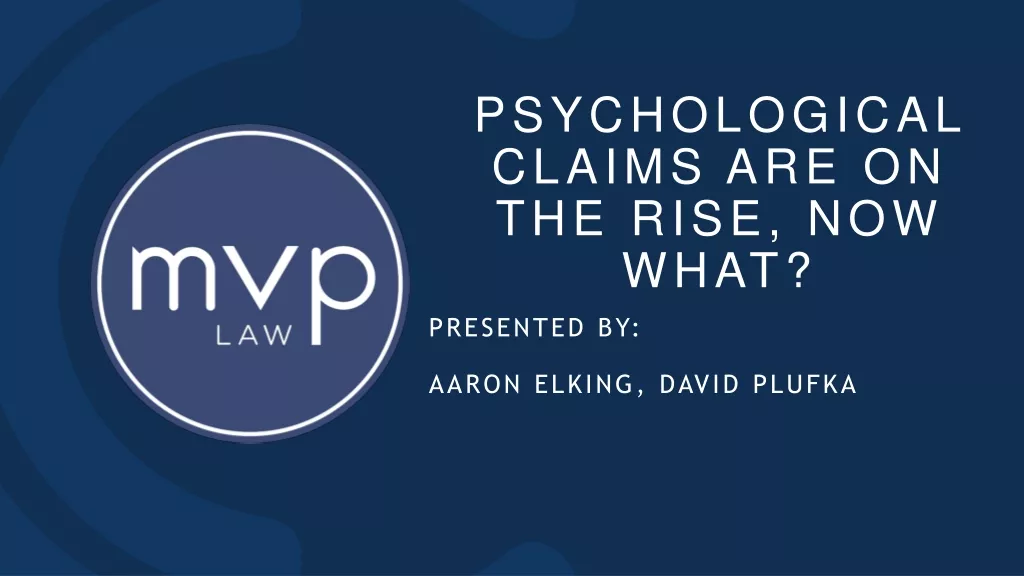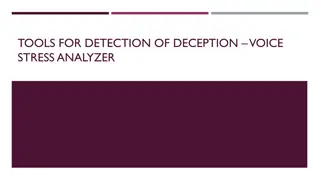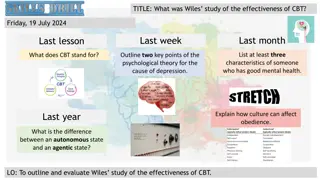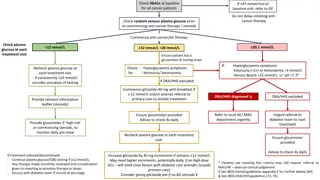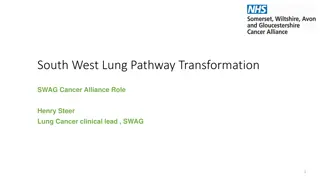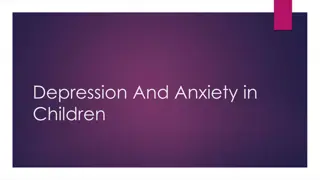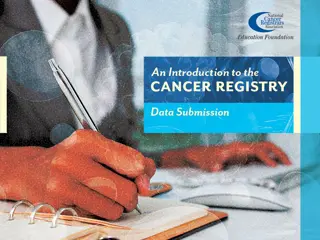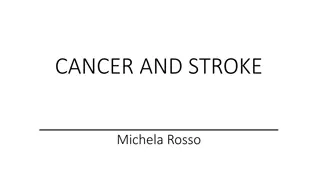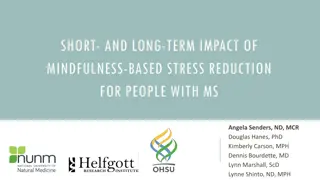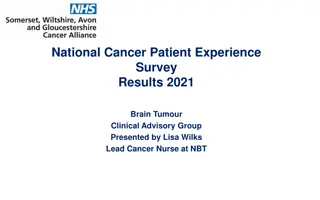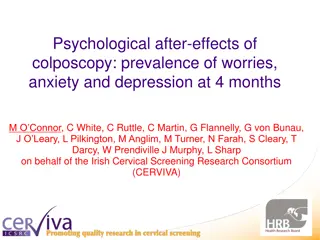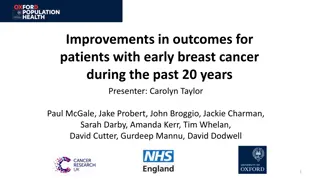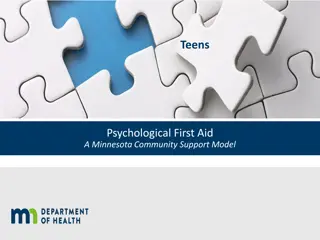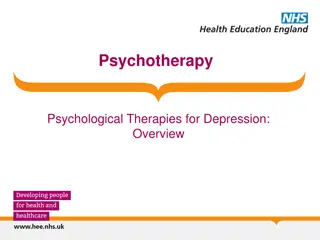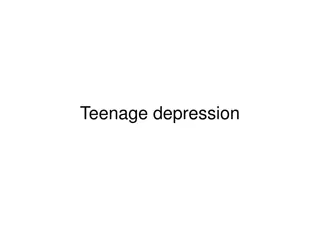Effectiveness of Psychological Intervention in Managing Stress and Depression Among Cancer Patients
A study was conducted to assess the effectiveness of a psychological intervention program in managing stress, depression, and subjective well-being among cancer patients. The study involved 132 cancer patients aged 35 to 65 years, with 72 patients in the experimental group receiving psychological interventions. Results showed a significant reduction in stress and depression levels and an improvement in subjective well-being post-intervention. Various tools including stress checklists, depression inventories, and counseling were utilized in the study.
Download Presentation

Please find below an Image/Link to download the presentation.
The content on the website is provided AS IS for your information and personal use only. It may not be sold, licensed, or shared on other websites without obtaining consent from the author.If you encounter any issues during the download, it is possible that the publisher has removed the file from their server.
You are allowed to download the files provided on this website for personal or commercial use, subject to the condition that they are used lawfully. All files are the property of their respective owners.
The content on the website is provided AS IS for your information and personal use only. It may not be sold, licensed, or shared on other websites without obtaining consent from the author.
E N D
Presentation Transcript
Original Article A Study on the Effectiveness and Scope of Psychological intervention on Stress, Depression and Subjective well being of Cancer Patients . Aravindan P P, Razeena M S, Sukumaran P School of Behavioural Sciences, Mahatma Gandhi University, Kottayam, Kerala, India Dr. Aravindan P P MBBS, DTCD, MPhil, PhD Principal Investigator :
ABSTRACT Background and Objective: 1. To study, the effectiveness of a psychological intervention programme in the management of cancer patients. 2. To study, the stress of cancer patients before and after the psychological intervention programme and to compare with the control group. 3. To study, the depression of cancer patients before and after the Psychological intervention programme and to compare with the control group. 4. To study, the Subjective well being of cancer patients before and after the psychological intervention programme and to compare with the control group.
Materials and Methods: Sample for the study was cancer patients. Newly detected and current cases undergoing treatment, Cancer patients in the age group 35 years to 65 years were chosen as sample. The sample was constituted by a total number of 132. 60 patients were taken as the control group 72 patients were taken as the experimental group. The investigator used the following tools to collect data 1. Stress Check List (SCL):- Alice P Mathew (1996), Mahatma Gandhi University, Kottayam. 2. Depression Inventory (DI) :- Malayalam- K.A Kumar and S.Vinod kumar(1998) School of Behavioural Sciences, Mahatma Gandhi University, Kottayam). 3. Personal Data Sheet (PDS) Prepared by the investigator (2004). 4. Psychological Intervention Package (PIP) Developed by the investigator (2004). 5. Health Education Brochure (HEB) prepared by the investigator (2004). 6. Guided Somato Psychic Relaxation with the help of Audio tape (GSPR) developed by Sreedhar .K.P (1996) of Kerala University. 7. Counselling: Done by a clinical psychologist and trained counsellor. Individual Counselling was given to each patient at the centre and later one follow up Counselling with in the first month .
Results: Stress Scores- F 5.83**,2.50**(df=2,142) Depression Scores-F 1.79,4.61**(df=2,142) Subjective well being Scores- F 5.38**(df=2,142) Conclusions: management of cancer patients was done on a sample of 132 cancer patients. Of which 60 patients were in the control group and 72 patients were in the experimental group. The age group was between 35 to 65 years. Four different groups of cancers namely head and neck cancers, gastro intestinal tract cancers, breast cancers and lung cancers were selected for the study. Psychological intervention was given to the experimental group and was not given to the control group. Follow up was made at the end of one month and third month for both the experimental and control groups. It is found that the psychological intervention package was found effective in reducing the stress and depression of cancer patients and improving subjective well being of cancer patients An intervention study on the effectiveness of psychological intervention in the KEY WORDS: Cancer, Stress, Depression, Subjective well being, Guided Somato Psychic Relaxation, Health Education, Counseling
INTRODUCTION Cancer may be regarded as a group of diseases characterized by 1. Abnormal growth of cells 2. Ability to invade adjacent tissues and even distant organs 3. The eventual death of the affected patient if the tumour has progressed beyond that stage when it can be successfully removed. Cancer can occur at any site or tissue of the body and may involve any type of cells. The major categories of cancers are: Carcinomas, Sarcomas, Lymphomas
In terms of incidence, the most common cancers worldwide are:- 1. Oropharyngeal Carcinoma 2. Lung cancer 3. Breast cancer 4. Colorectal cancer (40 %) (12.3 %) (10.4 %) (9.4 %) Thus, lung cancer accounts for most deaths from cancer in the world (1.1 million) annually, since it is most invariably associated with poor prognosis. The four most frequent cancers in India are:- For Males: Mouth/oropharynx, Oesophagus, Stomach , Lower respiratory tract (trachea/bronchus/lungs). For Females : Uterine cervix, Breast, Mouth/oropharynx , Oesophagus.
Studies suggest that patients emotional responses may partially determine the course of their disease. Exact mechanism by which the process could occur is not well understood. Evidence indicates that a patients emotional state may affect the immune system, the body s natural defenses that fight disease. In the case of cancer, it is possible that positive emotional responses may produce natural killer cells that help to control the size and spread of cancerous tumours. Negative emotions may suppress the ability of the same kind of cells to fight tumours. (Glaser et. al, 1986, Holland and Lewis, 1993; Anderson, Kiecolt and Glaser, 1994). Certain types of psychological therapy have the potential for extending the lives of cancer patients(Spiegel,1993). Stress is the response to events that threaten an individual s ability to deal adequately with the situation. According to Selye s(Selye,1976) general adaptation syndrome model, stress follows three stages; alarm and mobilization, resistance and exhaustion. High levels of stress prevent people from coping with life adequately.Negative consequences of stress cause: -Physical illness and psychological symptoms.
Depression is present in a quarter to half of all medical patients. Symptoms of depression:- a. Psychological , b. Somatic. guilt, loss of interest, loss of enjoyment and suicidal thinking. Somatic symptoms are reduced appetite, weight change, disturbed sleep, fatigue, loss of libido, bowel disturbance, and retardation. Symptoms of anxiety or depression are common when serious illness is diagnosed. This common psychological response to physical illness is known as adjustment disorder . Surgery, Chemotherapy and Radiotherapy are the three main different modes of treatment used alone or in combination for the management of cancer. This has given rise to the concept of multidisciplinary team comprising surgeons, oncologists, Pathologists, Radiologists and often specialized nurses. Psychological intervention like counselling, relaxation therapy etc., can be helpful in reducing the psychological problems like stress, anxiety etc. Psychological symptoms are depressed mood, reduced self esteem, pessimism,
The concept of Subjective well being is empirically derived and has several definitional aspects (Diener, 1984). Being subjective rather than objective well being is assessed from the internal perspective of the individual rather than measured against the objective criteria of normative standards. (Campbell, 1976). SWB, in fact, is a broad category of phenomena that includes peoples emotional responses, domain satisfactions, and global judgments of life satisfaction. (Diener et al: 1999). Specifically, reported that SWB consists of two distinctive components (Diener, 1994), and affective part, which refers to both the presence of positive affect (PA) and the absence of negative affect (NA) and a cognitive part.
Need and significance of the study cause of death after coronary heart disease. Certain cells in the body become altered and multiply rapidly and in an uncontrolled fashion. Although the processes involved in the spread of cancer are physiological in nature, accumulating evidence suggests that the emotional response of cancer patients to their disease may have a critical effect on its course (Pettingale et al. 1985). In the case of cancer, it is possible that positive emotional responses will produce natural killer cells that help to control the size and spread of cancerous tumours. Negative emotions may suppress the ability of the same kind of cells to fight tumours. Depression is a disabling illness that affects 15% to 25% of cancer patients. Patients who are receiving palliative care for cancer may have frequent feelings of stress and depression leading to a much lower quality of life. Counselling can greatly benefit a person with cancer. People living with cancer are often focused on their medical needs, and they may feel they do not have the time, money, energy, or need to care for their emotional needs. Relaxation techniques can also reduce tension, depression and anxiety; yet few cancer treatment programmes use these techniques on a regular basis. Cancer too has a multi-factorial aetiology. Cancer remains the second important
Relaxation therapy reduced symptoms of anxiety more than it did with any other side effects, regardless of the type of cancer treatment given to the patient. Studies related to effectiveness of psychological interventions in cancer are very few in India. Health education, Counselling and Guided Somato Psychic Relaxation (GSPR) techniques are assumed beneficial in this context. There is paucity of research in the area of psychological intervention in the management of cancer patients. Hence, there is a need to study the effectiveness of a scientifically accepted psychological intervention method. A Psychological intervention programme consisting of Health education, Counselling and Guided Somato Psychic Relaxation (GSPR) techniques will be cost effective and supplementary to the existing modes of cancer treatment. It is worth trying the effectiveness of such a Psychological intervention programme in reducing the psychosocial and physical problems of cancer patients. It will be useful to have a better prognosis for the cancer patients and to the mankind at large. Hence, the investigator proposed to undertake a study entitled
A Study on the Effectiveness and Scope of Psychological intervention on Stress, Depression and subjective well being of Cancer Patients . Objectives of the study 1. To study, the effectiveness of a psychological intervention package in the management of cancer patients. 2. To study, the stress of cancer patients before and after the psychological intervention programme and to compare with the control group. 3. To study, the depression of cancer patients before and after the Psychological intervention programme and to compare with the control group. 4. To study, the Subjective well being of cancer patients before and after the psychological intervention programme and to compare with the control group.
NULL HYPOTHESES 1. There will not be any significant difference in the stress of cancer patients before and after psychological intervention. 2. There will not be any significant difference in the depression of cancer patients before and after psychological intervention. 3. There will not be any significant difference in the Subjective well being of cancer patients before and after psychological intervention. 4. There will not be any significant difference in the stress of cancer patients with and without psychological intervention. 5. There will not be any significant difference in the depression of cancer patients with and without psychological intervention. 6. There will not be any significant difference in the Subjective well being of cancer patients with and without psychological intervention.
Variables selected for the study Stress, Depression, Subjective well being MATERIALS AND METHODS Sample Sample for the study was cancer patients. Newly detected and current cases undergoing treatment, Cancer patients in the age group 35 years to 65 years were chosen as sample. The sample was constituted by a total number of 132. 60 patients were taken as the control group 72 patients were taken as the experimental group. - Inclusion criteria group of the sample. Case- Control Study Pre test - Post test- Delayed post test design was used for this study. Patients selected for this study were categorized into four broad categories, as Head and Neck cancers, Cancers of Gastrointestinal tract, Cancer breast Cancer lung. Both males and females are included in the study as experimental and control
EXCLUSION CRITERIA 1. Non cancer patient. 2. Age below 35 and above 65 years. 3. Ischaemic heart diseases, 4. Paralysis. 5. Severely ill patient.
Tools The investigator used the following tools to collect data 1. Stress Check List (SCL):- Alice P Mathew (1996), Mahatma Gandhi University, Kottayam. 2. State Trait Anxiety Inventory (STAI) Malayalam version, Das and Kumar (1994). 3. Depression Inventory (DI) :- Malayalam- K.A Kumar and S.Vinod kumar(1998) School of Behavioural Sciences, Mahatma Gandhi University, Kottayam). 4. Personal Data Sheet (PDS) Prepared by the investigator (2004). 5. Psychological Intervention Package (PIP) Developed by the investigator (2004). 6. Health Education Brochure (HEB) prepared by the investigator (2004). 7. Guided Somato Psychic Relaxation (GSPR) with the help of Audio tape, developed by Sreedhar .K.P (1996) of Kerala University. 8. Counselling: Done by a clinical psychologist and trained counsellor. Individual Counselling was given to each patient at the centre and later one follow up Counselling with in the first month after collecting the data in the prescribed proforma. Counselling included problems related to the physical, psycho social, personal habits and treatment related problems and wellbeing of the individual. Care and support of the patient by the family also was looked into.
Procedure The investigator obtained permission from the Superintendent, District Hospital Palakkad and the Director, Institute of Palliative Care, Thrissur for collecting data and conducting the intervention study. Got the approval of Ethics Committee. The sample was collected from among the cancer patients attending Palliative Care Department of the District Hospital Palakkad and Institute of Palliative Care, Thrissur; observing the inclusion and exclusion criteria. Patients were categorized into control group andexperimental group. Those who received the psychological intervention programme constituted the experimental group and those who did not receive constituted the control group. Option was given to the patients either to undergo the psychological intervention or to continue with the treatment as advised from the center. Hence, the patients who had facilities to use a tape recorder for GSPR and willing to do relaxation at home were included in the experimental group. Written consent in printed proforma was obtained from the individual patients of the sample included in the study.
The investigator explained about the programme to the patients. The entries were made in the personal data sheet by the nurse of the center the printed tools were given to the patients and the responses were recorded by them. After this Counselling and GSPR were administered to the patient at the center. Printed health education material was given to the patients with instruction to read it. The family members were also instructed to help and encourage the patients to do the relaxation at home for three weeks. For which pre-recorded audio cassette was supplied by the investigator free of charges with direction to return the same after use. This was an intervention study with experimental design pre test-post test-delayed post test design. The pre test assessment of the different variable were made by using standard tools for both the control and experimental groups.
The psychological intervention package in the form of health education, counselling and relaxation was administered to the experimental group of cancer patients. Psychological intervention package was not administered to the control group. Patients in both control and experimental groups were followed up at the end of first month and third month and assessment was made using the same standard tools. Printed response sheets for marking the relaxation done at home were given to the patients in the experimental groups. After taking the case history and arriving at the diagnosis, recorded the responses in the personal data sheet and the different tools to measure stress, depression and subjective wellbeing; the client was told about the steps involved in the treatment. The client was further told that one step in the process is a procedure called relaxationtraining . In this, the client is requested to lie down on a comfortable cot in a supine position with the head slightly raised with the help of a pillow.
The client is further informed that the relaxation has both a physical and a mental stage. The person is also told that in the physical stage there are ten steps to be followed. The counselor teaches the client these steps. At the mental stage, there is visualization of a pond. The visualization in the state of mental relaxation will also be described. The client is given time to clarify doubts, if any. If there are no doubts, the procedure starts. The counselor sits slightly behind the client on one side of the cot to have an overall view of the client. Then the instructions are given slowly and softly. The instructions was given by the counselor using the pre recorded audio cassette. Individual Counselling was given to each patient at the centre and later one follow up Counselling with in the first month after collecting the data in the prescribed proforma.
Counselling included problems related to the physical, psycho social, personal habits and treatment related problems and wellbeing of the individual. Care and support of the patient by the family also was looked into. Counselling was done by the clinical psychologist at District Hospital Palakkad and by a practicing counselor at Institute of Palliative Care, Thrissur. Follow up counselling was done within three weeks. Follow up relaxation was done at the centre with the support of the trained nurse. Patients in the experimental group and control group were instructed to attend the center at the end of one month. All the printed tools were administered to the individual patients and response obtained. After the completion of the third month, a second follow up is done and all the tools are administered to the individual patients in the experimental group. The reposes are obtained in the printed format as done previously.
The printed proforma and tools were administered to the patients in the control group at the first visit; at the end of first month and at the end of third month. And responses were recorded by the individual patients. They were also advised for the continuation of treatment advice from the Palliative Care Center and to come for regular review. But the psychological intervention package was not administered to the any of the patients of the control group. Six patients defaulted at Palakkad and one patient defaulted at Thrissur centers during the study period. Four patients expired at Palakkad and two patients at Thrissur during the study period. The defaulted and expired cases were deleted from the sample. Altogether 60 patients were in the control group and 72 patients in the experimental group. Thus, the sample of the study comprised 132 cancer patients.
RESULTS Statistical analysis of the data The data collected was scored as per the manuals. With the support of an expert using approved statistical software the data was compiled and analyzed by standard and approved statistical tools. The sample comprised of four different types of cancer patients, three different variables for study; namely stress, depression and subjective wellbeing. Pre test, post test and delayed post test for the experimental groups and follow up at the end of first month and third month. Hence, the statistical tools used were one way ANOVA, repeated ANOVA, Analysis of covariance (ANCOVA) and Multivariate analysis of variance (MANOVA). The data were analysed based on the objectives and hypotheses by employing appropriate statistical methods using SPSS as given by Brace et al. (2003). The test for Least Significant Difference (LSD) for pair wise comparisons. The critical difference was calculated as per the procedure given by Broota, (1989).
Table 4.1 Summary of Repeated ANOVA of Stress Scores of cancer patients in Pre test, Post test and Delayed Post tests. It is found that the F ratio of the control group is significant at 0.01 levels. Hence, there is difference stress scores of the cancer patients in the control group in pre test, post test and delayed post tests. Also it is clear that the F ratio of the experimental group is significant at 0.01 level. A close observation of the F values of the control group and experimental group shows that there is significant reduction in the stress scores of the experimental group of cancer patients compared to the control group.
Table 4.2 LSD test for significance between pairs of mean Stress Scores of cancer patients in Pre, Post and Delayed post tests.
Table 4.3 Summary of Analysis of Covariance (ANCOVA) of Stress scores of cancer patients in post test and delayed post test. ** Significant at 0.01 level. of stress scores of the experimental group than that of the control group. As the between groups F ratio is significant at 0.001 level, it can be concluded that there is statistically significant difference between the control group and experimental group in the stress of cancer patients in the post test. A close observation of the mean values reveals that there is a significant reduction
Table 4.4 Summary of Repeated ANOVA of Depression scores of cancer patients in Pre test, Post test and Delayed Post tests. respect of the depression scores is significant at 0.01 level. It can be seen from the table that the F values of the depression scores group in
Table 4.5 LSD test for significance between pairs of Depression scores of experimental of cancer patients in Pre, Post and Delayed post tests.
Table 4.6 Summary of ANCOVA of Depression scores of cancer patients in Post and Delayed Post tests. As the between groups F ratio is not significant. It can be concluded that there is no statistically significant difference between the control group and the experimental group in the depression scores of cancer patients in the post test.
Table 4.7 Summary of Repeated ANOVA of Subjective Wellbeing scores of cancer patients in Pre test, Post test and Delayed Post tests. of the experimental group of cancer patients is significant at 0.01 level. It is evident from the table that the F value in respect of subjective well being scores
Table 4.8 LSD test for significance of between pairs of Subjective Wellbeing scores of Experimental Group of cancer patients in Pre, Post and Delayed post tests.
DISCUSSION The repeated ANOVA scores of stress in the Table No. 4.1 showed that F value is significant for the control and experimental group. Hence, the Least Significant Test (LSD) was done. From the Table No. 4.2 it can be seen that the mean difference value was significant for the between groups of pre test control and delayed post test control, pre test experimental and post test experimental, the pre test experimental and delayed post test experimental. There was significant difference in the stress of cancer patients who received the psychological intervention. The psychological intervention programme was effective in reducing the stress of the cancer patients . The F value of repeated ANOVA for the control group (F = 5.83**) and for the experimental group (F=23.50**) in Table No. 4.1 indicated that the cancer patients differed significantly in stress before and after the psychological intervention. A significant reduction in the stress was observed immediately after the intervention.
Even though, the mean difference values were significant in both the control and experimental groups the value was higher for the experimental group. Hence, it can be stated that the effect of the intervention was sustainable. The F value of ANCOVA of stress scores in the post test and delayed post test between the control (F=18.67**) and experimental group (F = 13.65**) as per Table No. 4.12 showed that there was significant reduction in the stress of the cancer patients in the experimental group. In this study, the psychological intervention could reduce the stress of the cancer patients by way of possibly an interplay of these factors already narrated, which act at neuroendocrine and cellular level. The stress reduction for those who received the intervention was lasting, which is obvious from the results obtained.
When we analyze the depression scores of the cancer patients of the control and experimental groups in post tests and delayed post tests; as per the findings in Table No. 4.6 the F values in the repeated ANOVA for the control group was not significant; but in the experimental group F value was significant. The F values of the ANCOVA for depression as per Table No. 4.16 showed that for the between groups of control and experimental in post test (F = 2.18) and in the delayed post test (F = 1.75) were not significant. Hence, it can be stated that there was no significant difference in depression between the control and experimental group. However, the depression scores as per Table No. 4.6 F value (F=4.61**) of repeated ANOVA showed that there was significant reduction in the depression of cancer patients in the experimental group in delayed post tests.
The LSD test for significance for the depression as per the Table No. 4.7 found that the mean difference values were significant. For the pre experimental and post experimental depression scores. In addition, the mean difference value was significant for the between pre test experimental and delayed post test experimental scores. It shows that the psychological intervention was effective in reducing the depression of the caner patients. It is evident from the table that the F value in respect of subjective well being scores of the experimental group of cancer patients is significant at 0.01 level. (F=5.38**) LSD test for significance of between pairs of Subjective Wellbeing scores of Experimental Group of cancer patients in Pre, Post and Delayed post tests, as per table 4.8 Hence it can be stated that the psychological intervention programme was effective in improving the subjective well being of cancer patients
RESULTS After perusing, the results obtained, interpretation was done. 1. There was significant difference in the stress of cancer patients before and after psychological intervention. 2. There was significant difference in the depression of cancer patients before and after psychological intervention. 3. There was significant difference in the subjective well being of cancer patients before and after psychological intervention. 4. There was significant difference in the stress of cancer patients with psychological intervention and no significant difference without psychological intervention. 5. There was significant difference in the depression of cancer patients with psychological intervention and no significant difference without psychological intervention. 6. There was significant difference in the subjective well being of cancer patients with psychological intervention and no significant difference without psychological intervention. 7. There is evidence for improvement of the subjective well being of the experimental group. Hence the null hypothesis is rejected. It can be stated that the psychological intervention programme was effective in reducing the stress, depression and improving the subjective well being of the cancer patients in the experimental group.
FINDINGS OF THE STUDY 1. The Stress experienced by the cancer patients in the experimental group was found reduced due to the psychological intervention programme and hence it was effective. 2. The Depression experienced by the cancer patients in the experimental group was found reduced due to the psychological intervention programme and hence it was effective. 3. The Subjective wellbeing of the cancer patients in the experimental group has improved due to the psychological intervention programme and hence it was effective. 4. There was reduction in the stress, depression and improvement in the subjective well being of the cancer patients compared with before and after the psychological intervention 5. The patients in the control group did not show improvement compared to the experimental group. 6. Hence, it can be concluded that the psychological intervention programme was effective for the cancer patients who received it.
IMPLICATIONS OF THE STUDY One of the objectives of the study was to develop a Psychological intervention programme with three main components: Health education, Counselling and Guided somato psychic relaxation. After extensive literature review, it was convinced that there is interplay of several factors from genetics to human behaviour, in causing cancer. The relevance of the health education, Counselling and guided somato psychic relaxation in this package could be highlighted through the findings of this study. The treatment of cancers is done in the modern medicine with the help of surgery, radiotherapy and chemotherapy. A new ray of hope was opened with the addition of palliative care. It is a proven fact that any patient who is suffering from cancer and who is aware of his disease will have psychological symptoms likes stress, anxiety and depression at variable levels. Over and above, they may have different symptoms due to the disease and as the effect of surgery, radiotherapy and chemotherapy. Finally, many patients depend on palliative care in the form of hospital care, home based care and hospice care.
LIMITATIONS OF THE STUDY 1. This study was conducted at District Hospital Palakkad and the Institute of Palliative Care Thrissur. The number of patients at Palakkad, who participated in the study, were less. This is because of low attendance of patients at District Hospital Palakkad. At the Institute of Palliative Care Thrissur, large numbers of patients were attending everyday. Hence, there were more patients in the control and sixty in the experimental group. 2. Even though there were 70 patients in the control group and 75 patients in the experimental group, six patients discontinued and four patients died at Palakkad; one patient died and two patients discontinued. Hence, there were only 60 patients in the control group and 72 patients in the experimental group to complete the study. 3. The study was limited to patients from Palakkad and Thrissur. 4. The patients who were willing to undergo relaxation, but due to lack of audio player for doing relaxation at home were excluded from the experimental group. 5. Since the package of the psychological intervention had three components, namely health education Counselling and GSPR the investigator was not in a position to conclude the effectiveness of each component.
SCOPE AND SUGGESTIONS FOR FURTHER RESEARCH 1. Studies using psychological intervention may be conducted on cancers of other body systems. 2. Studies using individual component of the psychological intervention package may be done to understand which is more effective. 3. The effectiveness of different relaxation techniques can be studied among cancer patients. 4. Psychological intervention can be conducted among palliative care patients of different types of cancers. 5. Studies may be conducted using different types of relaxation techniques. 6. Studies may be conducted using Cognitive behavioural therapy. 7. Studies may conducted using music therapy for relaxation in cancer patients. 8. Psychological intervention and quality of life of cancer patients is an area of future research. 9. The effectiveness of conselling and relaxation can be studied among the cancer patients undergoing Radio therapy and chemotherapy.
CONCLUSION An intervention study on the Effectiveness and Scope of Psychological intervention on Stress, Depression and Subjective well being of Cancer Patients was done on a sample of 132 cancer patients. Of which sixty patients were in the control group and seventy-two patients were in the experimental group. The age group was between 35 to 65 years. Four different groups of cancers namely head and neck cancers, gastro intestinal tract cancers, breast cancers and lung cancers were selected for the study. Study on the effectiveness of the psychological intervention was done by using case control study with pre test-post test- delayed post test - design. Psychological intervention was given to the experimental group and was not given to the control group. Follow up was made at the end of one month and third month for both the experimental and control groups. It is found that the psychological intervention programme was found effective in reducing the stress, depression and improving subjective well being of cancer patients. *****
REFERENCES 1. Abt, C.C. (1975). The social costs of cancer: Soc Indicat Res 2: 175-190:Psychosomatic Medicine Vol. 45, No. 2 (May 1983) 169. 2. Alice P Mathew. (2002). Effectiveness of Stress Management Program in Cardiac Surgical Patients. Phd Thesis, Mahathma Gandhi University, Kottayam, Kerala. 3. Allen, S.M., Shah, A.C., Nezu, A.M., Ciambrone, D., Hogan, J., Mor, V. A.(2002). Problem- solving approach to stress reduction among younger women with breast cancer. Cancer, 94(12):3089-3100. 4. American Cancer Society. (1981). Cancer facts and figures. New York, American Cancer Society, Inc, p3. 5. American Psychiatric Association. (1994). Diagnostic and statistical manual of mental disorders. Washington, DC: 6. American Psychiatric Association. (1987). Diagnostic and Statistical Manual of Mental Disorders (ed 3), Revised. Washington, DC, 7. American Psychiatric Press. American Psychiatric Association (1994). Diagnostic and statistical manual of mental disorders. (4th Edition) Washington DC: AmericanPsychiatric Association. 8. Andersen, B.L. (2002). Biobehavioral outcomes following psychological interventions for cancer patients. Journal of Consulting ClinicalPsychology, 70, 590-610. 9. Anderson, S.I., Taylor, R., Whittle, I.R.(1999). Mood disorders in patients after treatment for primary intracranial tumours. Br J. Neurosurg, 13, 480 485. 10. Anderson, B.L., Kiecolt., & Glaser, J.K., & Glaser, R. (1994). A bio behavioral model of cancer stress and disease course, AmericanPsychologist, 49, 389-404.
11. Bailey, & Loves.(2004). Short Practice of Surgery, 24th Edition (2004), P 702, http://www.arnoldpublishers.com. Bailey, & Love s. (2004). Short Practice of Surgery, 24th Edition (2004), P 212-216, http://www.arnoldpublishers.com. 12. Beck, D.A., Koenig, H.G., Beck, J.S. (1998). Depression. [Review] [141 refs]. Clinics in Geriatric Medicine, 14, 765-86. Beiser, M. (1974). Components and Correlates of mental well-being. Journalof Health and Social Behaviour, 15, 320-327. 356 13. Brace, N., Kemp, R., Snelgar, R. (2003). SPSS for psychologists (2nd Edn.). Palgrave MacMillan, New York. 14. Broota, K.D. (1989). Experimental Design in Behavioural Research. Wiley Eastern Limited, New Delhi. 15. Casey, D.A. (1994). Depression in the elderly. [Review] [17 refs]. Southern Medical Journal, 87, 559-63. 16. Dacher, E.S. (1991). PNI: Psychoneuroimmunology the new mind/body healing program (pp. 22; 71-73). New York, NY: Paragon House. 17. Data Monitor (2004). Pipeline Insight: Depression - Novel therapies key to market penetration. http://www.datamonitor.com/ Products/Free/Report/DMHC1892/010DMHC1892.pdf. 18. Davidson, K.W., Trudeau, K.J., Ockene, J.K., Orleans, C.T, Kaplan, R.M. (2004). A primer on current evidence-based review systems and their implications for behavioral medicine. Annals of Behavioral Medicine, 28(3):226-238. 19. Davidson. (2002). Principles and practice of medicine, 19th Edition, P 229. 20. Dugan, W., McDonald, M.V., Passik, S.D. (1998.). Use of the Zung Self- Rating Depression Scale in cancer patients: Feasibility as a screening tool. Psychooncology 7, 483-493.
21. Glaser, R., Rice, J., Speicher, C.E., Stout, J.C., & Kiecolt., Glaser, J.K. (1986). Stress Depress interferon production by leukocytes concomitant with a decrease in natural killer cell activity, BehavioralNeuroscience, 100, 675-678. 22. Holland, J.C., & Lewis, S. (1993), Emotions and Cancer : What do we really know? In D.Goleman & J. Gurin (Eds.) Mind-body medicine, Yonkers, NY, Consumer Reports Books. 23. Indian Association of Palliative Care (IAPC)., (2007). Certificate Course in Essentials of Palliative Care, Handbook, P 35-53 24. Indian Association of Palliative Care (IAPC)., (2007). Certificate Course in Essentials of Palliative Care, Handbook, P 60-61. 25. Indian Association of Palliative Care (IAPC)., (2007). Certificate Course in Essentials of Palliative Care, Handbook,P 60-61 26. Joy, S., Sreedhar, K.P. (1998). Effect of guided somatopsychic relaxation on essential hypertension, Indian Journal of Clinical Psychology, Mar; 25(1): 66-76. 27. Kielcot-Glaser, J.K., & Glaser,R., (1999). Psychoneuroimmunology and cancer: fact or fiction? European Journal of Cancer, 35(11), 1603- 1607. 28. Kielcot-Glaser, J.K., & Glaser.R (1986), Behavioral influences on immune function: Evidence for the interplay between stress and health. In T. Field, P. McCabe, & N. Schneiderman (Eds.) Stress and coping (Vol. 2), Hillsdale, NJ: Erlbaum. 29. Lakshmidevi, S. (1994), The effect of Guided Somato Psychic Relaxation in the treatment of habituation to a psychotropic drug: A case report, University of Kerala, Trivandrum. 30. Lakshmidevi, S. (1995). A comparative study of the efficacy of the Guided Somato Psychic Relaxation and Shavasana relaxation in some anxiety based disorders unpublished M.Phil Dissertation University of Kerala, Trivandrum.
31. Lawrence, L., Christie, D.(1979). Quality of life after stroke: A three-year follow-up. Age Ageing, 8:167-172. 32. Lawrence D. Wagman., Timothy, E., Byun, M.D. (2009). Managing Colorectal Cancer Liver Metastases, http://www.cancernetwork.com/colorectal-cancer/content/article/10165 /1486433, ONCOLOGY. Vol.23 No. 12, P 1-5.387 33. Lazarus, R.S., & Folkman, S. (1984). Stress, appraisal, and coping. New York: Springer. 34. Massie, M.J., Holland, J.C. (1990). Depression and the cancer patient. J Clin Psychiatry 51:12- 17, 1990. 35. Meyer, T.J., Mark, M.M. (1995). Effects of psychosocial interventions with adult cancer patients: A meta-analysis of randomized experiments. Health and Psychology, 14(2):101- 108. 36. Park, K. (2000). Park s Text Book of Preventive and Social Medicine, 16th Edition, P 283-291. 37. Pettingale, K.W., Morris, T., Greer, S., & Haybittle, J.L. (1985). Mental attitudes to cancer: An Additional Prognostic Factor, Lancet, 750. 397 38. Selye, H., (1976). The stress of life, New York: McGraw Hill.403 39. Spiegel, D., (in Press) Living beyond limits, New York: Times Books. Spielberger, C.D., Sydeman, S.J. (1994). State-Trait Anxiety Inventory and State-Trait Anger Expression Inventory. In: Maruish ME, editor. The use of psychological tests for treatment planning and outcome assessment. Hillsdale, NJ: Lawrence Erlbaum Associates, 292-321. 40. Sreedhar, K.P. (1996). Guided Somato Psychic Relaxation, Life, Trivandrum. Sreedhar, K.P., & Kumar Bhagavathi, G.P. (1989). Effect of a Group Relaxation technique on the pre and post pulse rate of student volunteers. Unpublished Report Department of Psychology, University of Kerala, Trivandrum.
41. Thomas, Simi. (1995). Efficiency of relaxation techniques in the management of patients treated for Coronary Artery Diseases : M.Phil. Dissertation, University of Kerala, Trivandrum. 42. Weisman, A. (1976). A model for psychosocial phasing in cancer. Gen Hosp Psychiatry, 1:187 195. 43. Weisman, A.D. (1979). Coping with cancer. New York, McGraw-Hill. 412 44. Wellisch, D.K., Kaleita, T.A., Freeman, D., Cloughesy, T., Goldman, J. (2002). Predicting major depression in brain tumor patients. Psychooncology, 11:230 238. 45. Williams, S., Dale, J. (2006). The effectiveness of treatment for depression/ depressive symptoms in adults with cancer: a systematic review. Br JCancer, 94:372 390. 46. Walsh, A. (2004). A randomized controlled trial of a nurse-administered educational intervention for improving cancer pain management in ambulatory settings. Patient Educational Counselling, 53, 227-237. How to cite this article: Aravindan P P, Razeena M S, Sukumaran P.(2012) A Study on the Effectiveness and Scope of Psychological intervention on Stress, Depression and Subjective well being of Cancer Patients . Source of Support: Nil, Conflict of Interest: None declared



